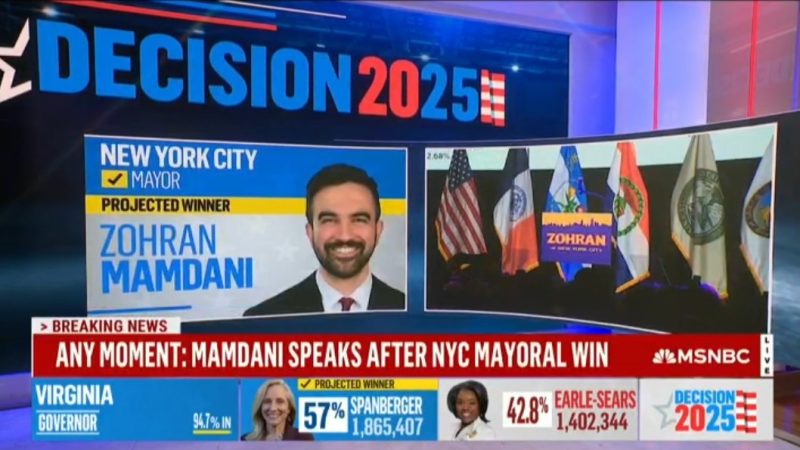
Democrats didn’t just win. They routed. In a tri-coastal rebuke of Trump-era politics, Democrats swept marquee races in Virginia, New Jersey, and New York City and looked poised to gain more leverage out West.
Abigail Spanberger took Virginia’s governorship in a decisive win. Mikie Sherrill cruised in New Jersey. And Zohran Mamdani’s insurgent campaign flipped the script in America’s biggest city. If you were looking for a temperature check on the country’s appetite for MAGA 2.0 and shutdown politics, you got it.
The data points tell a clean story: a broad, multi-faction Democratic coalition, moderates and progressives alike, outperformed in the places that will define political power over the next two years. This wasn’t a fluke. It was about institutions, competence, and voters signaling they want guardrails back.
Virginia: A Pragmatist Landslide
Spanberger’s victory is big on its own, Virginia’s first female governor, but the margin and the mix matter more. A former CIA officer and moderate Democrat, she framed the race around costs, safety, and governing without chaos, what she calls “practical results.” Voters agreed. Spanberger beat Republican Winsome Earle-Sears comfortably in a contest widely read as a referendum on Trump’s second-term style of governance and federal workforce crackdowns hitting Northern Virginia. Calls came early; the sweep extended to other statewide races, with Democrats notching a trifecta of top wins and flipping key leadership posts down ballot. This wasn’t a squeaker or a blue bubble phenomenon, it was a governing mandate grounded in competence and stability, not vibes.
New Jersey: The Suburbs Re-Assert Themselves
In New Jersey, Rep. Mikie Sherrill, a Navy veteran who campaigned on rule of law and bread-and-butter governance, beat GOP retread Jack Ciattarelli by double digits, widening Democrats’ margin compared with 2024. With over 90% of the vote counted, Sherrill led roughly 56% to 43%, and the race was called early. The decisive win alongside strong Democratic performance in State Assembly races is another sign the supposed anti-incumbent drift has ebbed when the GOP brand is fused to Trump’s shutdown brinkmanship and infrastructure hostage taking. Sherrill’s win makes three consecutive Democratic gubernatorial terms in New Jersey, rare and revealing.
New York City: The Progressive Bet Pays Off
Zohran Mamdani’s victory for mayor cemented the night’s storyline: Democrats can win from the center in swingy statewide races and from the left in deep-blue cities when they embody urgency and deliver a plausible plan. The race was called quickly and turnout topped historic thresholds. Mamdani’s win over Andrew Cuomo, running as an independent, and Republican Curtis Sliwa is also a data point about party discipline: the appetite for back-to-the-future celebrity politics is waning. Voters chose generational change with an explicit public safety plus economic justice frame. That’s not an ideological contradiction; it’s the future of big-city governance.
California’s Prop 50: The National Stakes Of A State Vote

Out West, California’s Proposition 50, allowing a mid-cycle redraw to counter GOP gerrymanders elsewhere, was approved by the voters. Democrats could net up to five House seats, meaning the party didn’t just win last night, they set the table for 2026 and beyond.
Republicans nationalized redistricting; Democrats appear ready to stop unilaterally disarming. Whatever your view of independent commissions, there’s a rule of law irony here: the best way to fix asymmetry is often through the system itself, legislating and voting, rather than waiting for judicial saviors.
Why This Sweep Happened
- Backlash to governing by threat: Voters punish shutdowns, rights rollbacks, and performative cruelty. Trump’s posturing, then blaming losses on not being on the ballot, only underscored the problem. Governing is a job, not a social feed.
- Coalition discipline: Democrats bridged factions. Spanberger’s pragmatic moderation in Virginia and Mamdani’s progressive surge in NYC didn’t cancel each other; they complemented each other. Add Sherrill’s institutionalist pitch in New Jersey and you have a party that can flex across terrains.
- Institutional stakes, not just ideological vibes: From courts in Pennsylvania to redistricting in California, voters showed they understand the meta game, who draws the maps, who counts the votes, who sets the rules. When democracy’s machinery is the ballot question, Democrats benefit because they campaign to preserve it.
The Bigger Picture: De-Polarization Is Not The Same As Depoliticization
If you look at the last quarter century, the country has moved toward landslide blowout counties and away from swing geography, a structural challenge for persuasion politics. Yet these results show persuasion still matters when the argument is about institutions and stability. Voters who may disagree on policy converge on a basic proposition: stop breaking the system. That’s why pragmatism over partisanship landed in Virginia and why New Jersey’s suburbs snapped back hard. The map isn’t less polarized; it’s more strategic.
What Changes Now
- The House math shifts: If Prop 50 passes, Democrats plausibly add several California seats. Combined with suburban overperformance visible in New Jersey and Virginia’s statewide trend, the 2026 House battlefield just got friendlier.
- GOP incentive problem: Republicans face a choice, double down on Trumpist grievance that energizes base counties but alienates vote-rich metros and suburbs, or rebuild a chamber-of-commerce conservatism that competes in states like Virginia and New Jersey. Last night suggests the base-first approach has diminishing returns.
- Progressive governance test: Mamdani now has to deliver credible public safety, housing, and quality-of-life gains in NYC. If he does, he strengthens the left’s argument inside the coalition. If not, the center will argue last night’s wins came despite, not because of, the left. Either way, voters will measure outcomes, not slogans.
The Take
Call it an institutionalist realignment. Voters didn’t just repudiate GOP shutdown politics; they rewarded Democrats who promised to make the machine run, on time trains, functional schools, safer streets, courts that aren’t captured, and a Congress that reflects actual voters, not cartographers’ fantasies. In a hyper-polarized era of blowout counties, it turns out competence can still be a landslide message.
